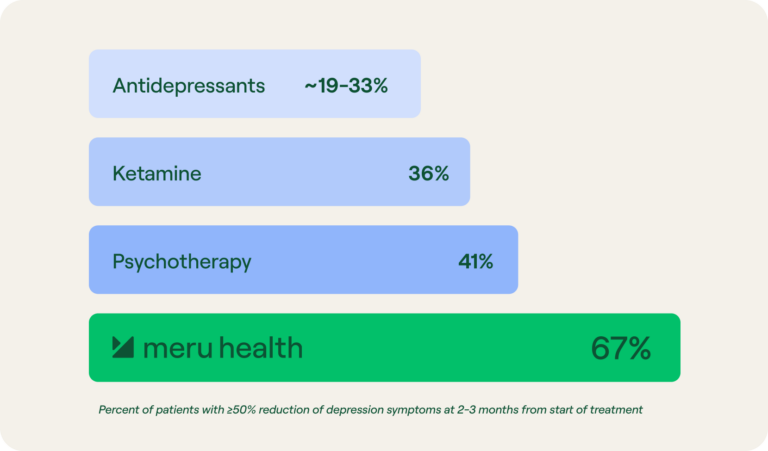July 2024
Meru Health vs traditional treatment: Clinical outcomes comparison

As part of our commitment to research and transparency, we publish peer-reviewed scientific studies in academic journals, white papers, and blog posts regarding the clinical or financial/cost savings outcomes of our treatments and interventions. In this article, we explore how Meru Health’s clinical outcomes compare against other mental health treatments.
The problem with many traditional treatment modalities, such as antidepressants and cognitive behavioral therapy, is their often low clinical efficacy. When research has been conducted to evaluate their effectiveness, many studies report outcomes in a way that can be easily misinterpreted. This can lead to an overestimation of the benefits and an underestimation of the limitations of these treatments, making it challenging for patients and healthcare providers to make fully informed decisions.
How Meru Health's outcomes compare to traditional treatment modalities
Recently, our research team compared the clinical efficacy of various treatments for depression and Meru Health. As part of this review, the team reviewed numerous studies and meta-analyses regarding antidepressant medication, traditional psychotherapy (cognitive behavioral therapy) as well as ketamine as a more modern treatment for depression.
Our analysis showed that a critical mindset and attention to detail are necessary to understand the clinical efficacy of various treatments. Many research papers report outcomes in a way that can be easily misinterpreted, and many studies that could have changed the overall picture of treatment efficacy have been left unpublished, such as in this example—antidepressants and the placebo effect.
“Almost half of the clinical trials sponsored by the drug companies have not been published.” – Antidepressants and the Placebo Effect
In our analysis, we mainly looked at studies analyzing real-world data that likely have less, if any, bias in terms of how data is analyzed or results presented.
The analysis revealed significant differences among different treatment modalities for depression.

1. Rush et al., Kirsch et al. & Gaynes et al 2.McInnes et al. 3. Cuijpers et al. 4. Meru Health.
Each of the studies reviewed as part of this analysis are referenced above. In Meru Health’s case, the reference links to a recently published data review (with n = roughly 14,000 patients), which has not been peer-reviewed yet. If we were to look at only peer-reviewed and published data, Meru Health would stand at 56% according to this study reference: Economides et al. (Several authors of the Economides study received compensation from Meru Health for the research work).
Setting a new standard for mental health care
In conclusion, Meru Health’s treatment for depression is significantly more effective than the other treatment modalities. This substantial improvement in clinical outcomes highlights the potential of Meru Health to set a new standard in mental health treatment.
By leveraging innovative, evidence-based approaches and prioritizing transparency in reporting outcomes, Meru Health addresses the shortcomings of traditional treatments and offers a more effective solution for individuals struggling with depression.
Furthermore, focusing on real-world data ensures that our findings reflect actual patient experiences, minimizing biases that often skew clinical trial results. This commitment to accuracy and efficacy not only benefits our patients but also contributes to the broader field of mental health by providing reliable data that can inform future research and treatment development.
As we continue to publish our findings and compare them with existing treatments, we aim to transform mental health care, offering hope and tangible improvements to those in need. Our dedication to transparency and rigorous research ensures that both patients and healthcare providers can trust the effectiveness of Meru Health’s interventions, paving the way for better mental health nationwide.
Want to learn more about Meru Health clinical outcomes? Read our report on Meru Health’s 2024 data.





